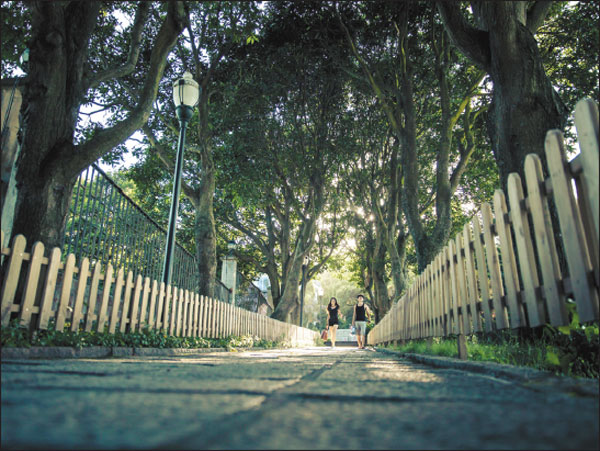Xiamen Special: Environmental efforts underway to tackle pollution
|
Siming district has developed 10 fitness trails to give local residents more green spaces to relax and enjoy the outdoors. Guo Shiming / Winner of Siming District Tourist Photography Contest |
Local authorities are making great efforts to tackle air pollution in Siming district in the coastal city of Xiamen in Fujian province, to create a cleaner and fresher future for both residents and visiting tourists from around the world.
Xiamen has a reputation of being the "garden city" of southeast China.
According to the Ministry of Environmental Protection, the coastal city was ranked third on a national list of air quality in January 2015 and beat 70 cities around the country, where air quality is monitored daily.
Statistics showed that in 2014, Siming district saw 16 lightly and moderately polluted days, which was seven days less than the previous year.
In the first two months of 2015 the district was ranked top among the six districts in Xiamen in regards to air quality. This put it in the lead once again after winning the title four times at the end of last year.
According to Siming's district environmental protection bureau, more than 1 million permanent residents live in the 78-square-kilometer area. The population density creates challenges in keeping a balance between developing the economy and protecting the environment.
However, the district's environmental protection authority said its efforts increased the green landscaped areas in Siming district by 11 hectares and 45 percent of the district is now covered with grass and trees. Ten fitness trails and 12 parks were also developed to give local residents more green spaces to relax and enjoy the outdoors.
Favorable policies were also introduced to push forward industrial adjustment and upgrading.
Low energy-consuming service industries including finance, trade, tourism, information services, conferences and exhibitions were emphasized to give the district a fresh economic boost.
To a great extent, traditional industries, which were once the government's major income source, were replaced by modern, high-tech industries without harming the economy. In 2014, the government's revenue from Siming district reached 18 billion yuan ($2.9 billion), almost double the figure from four years ago.
As well as the changes that economic restructuring and industrial upgrading have brought, the district is embarking on other measures to fight against air pollutants.
The district's environmental bureau is aiming to control dust pollution sources, which are the main cause of high levels of PM2.5, particulates of less than 2.5 micrometers. Spray systems were installed to remove dust at construction sites and trucks that carry soil and waste have been put under close supervision.
Siming district is a popular tourism destination in China and is home to about 6,000 restaurants and cafes, which the authority said put pressure on their environmental protection work.
The district's environmental protection bureau started a campaign to try and relocate a large proportion of the restaurants and cafes to 15 food courts and designated gourmet streets. An online supervision system for oil fumes was installed to provide realtime monitoring data to the bureau.
liuxiaoyu@chinadaily.com.cn



















